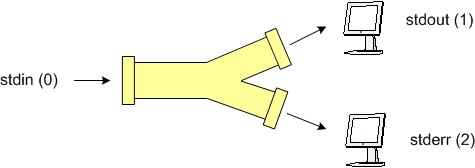Working on a remote server
Advanced Topics at the command line
We will not cover this during class, it is for your reference. You will also have the opportunity to further practice and learn about the command line in EDS-215.
Connecting to a remote server via ssh
From the gitbash (MS Windows) or the terminal (Mac) type:
ssh workbench-1.bren.ucsb.eduYou will be prompted for your username and password.

You can also directly add your username:
ssh brun@workbench-1.bren.ucsb.eduIn this case, you will be only asked for your password as you already specified which user you want to connect with.
Unix systems are multi-user
- Who else is logged into this machine?
who - Who is logged into “this shell”?
whoami
Getting help
<command> -h,<command> --helpman,info,apropos,whereis- Search the web!
finding stuff
Show me my Rmarkdown files!
find . -iname '*.Rmd'Which files are larger than 1GB?
find . -size +1GWith more details about the files:
find . -size +1G -lsGetting things done
Some useful, special commands using the Control key
- Cancel (abort) a command:
Ctrl-cNote: very different than Windows!! - Stop (suspend) a command:
Ctrl-z Ctrl-zcan be used to suspend, then background a process
Process management
- Like Windows Task Manager, OSX Activity Monitor
top,ps,jobs(hitqto get out!)killto delete an unwanted job or process- Foreground and background:
&
What about “space”
- How much storage is available on this system?
df -h - How much storage am “I” using overall?
du -hs <folder> - How much storage am “I” using, by sub directory?
du -h <folder>
History
- See your command history:
history - Re-run last command:
!!(pronounced “bang-bang”) - Re-run 32th command:
!32 - Re-run 5th from last command:
!-5 - Re-run last command that started with ‘c’:
!c
A sampling of simple commands for dealing with files
wccount lines, words, and/or charactersdiffcompare two files for differencessortsort lines in a fileuniqreport or filter out repeated lines in a file
Get into the flow, with pipes

stdin, stdout, stderr$ ls *.png | wc -l
$ ls *.png | wc -l > pngcount.txt
$ diff <(sort file1.txt) <(sort file2.txt)
$ ls foo 2>/dev/null- note use of
*as character wildcard for zero or more matches (same in Mac and Windows) ?matches single character;_is SQL query equivalent
Text editing
Some editors
vimemacsnano
$ nano .bashrcSearching advanced utilities
grepsearch files for textsedfilter and transform textfindadvanced search for files/directories
grep
Show all lines containing “bug” in my R scripts
$ grep bug *.RNow count the number of occurrences per file
$ grep -c bug *.RPrint the names of files that contain bug
$ grep -l bug *.RLet’s look at our text file
catprint file(s)headprint first few lines of file(s)tailprint last few lines of file(s)less“pager” – view file interactively (typeqto quit command)od --t“octal dump” – to view file’s underlying binary/octal/hexadecimal/ASCII format
$ brun@aurora:~/data$ head -3 env.csv
EnvID,LocID,MinDate,MaxDate,AnnPPT,MAT,MaxAT,MinAT,WeatherS,Comments
1,*Loc ID,-888,-888,-888,-888,-888,-888,-888,-888
1,10101,-888,-888,-888,-888,-888,-888,-888,-888
$ brun@aurora:~/data$ head -3 env.csv | od -cx
0000000 E n v I D , L o c I D , M i n D
6e45 4976 2c44 6f4c 4963 2c44 694d 446e
0000020 a t e , M a x D a t e , A n n P
7461 2c65 614d 4478 7461 2c65 6e41 506e
0000040 P T , M A T , M a x A T , M i n
5450 4d2c 5441 4d2c 7861 5441 4d2c 6e69
0000060 A T , W e a t h e r S , C o m m
5441 572c 6165 6874 7265 2c53 6f43 6d6d
0000100 e n t s \r \n 1 , * L o c I D ,
6e65 7374 0a0d 2c31 4c2a 636f 4920 2c44
0000120 - 8 8 8 , - 8 8 8 , - 8 8 8 , -
382d 3838 2d2c 3838 2c38 382d 3838 2d2c
0000140 8 8 8 , - 8 8 8 , - 8 8 8 , - 8
3838 2c38 382d 3838 2d2c 3838 2c38 382d
0000160 8 8 , - 8 8 8 \r \n 1 , 1 0 1 0 1
3838 2d2c 3838 0d38 310a 312c 3130 3130
0000200 , - 8 8 8 , - 8 8 8 , - 8 8 8 ,
2d2c 3838 2c38 382d 3838 2d2c 3838 2c38
0000220 - 8 8 8 , - 8 8 8 , - 8 8 8 , -
382d 3838 2d2c 3838 2c38 382d 3838 2d2c
0000240 8 8 8 , - 8 8 8 \r \n
3838 2c38 382d 3838 0a0dCreate custom commands with “alias”
alias lwc='ls *.jpg | wc -l'
You can create a number of custom aliases that are available whenever you log in, by putting commands such as the above in your shell start-up file, e.g. .bashrc
Aknowledgements
This section reuses a lot of materials from NCEAS Open Science for Synthesis (OSS) intensive summer schools and other training. Contributions to this content have been made by Mark Schildhauer, Matt Jones, Jim Regetz and many others.
